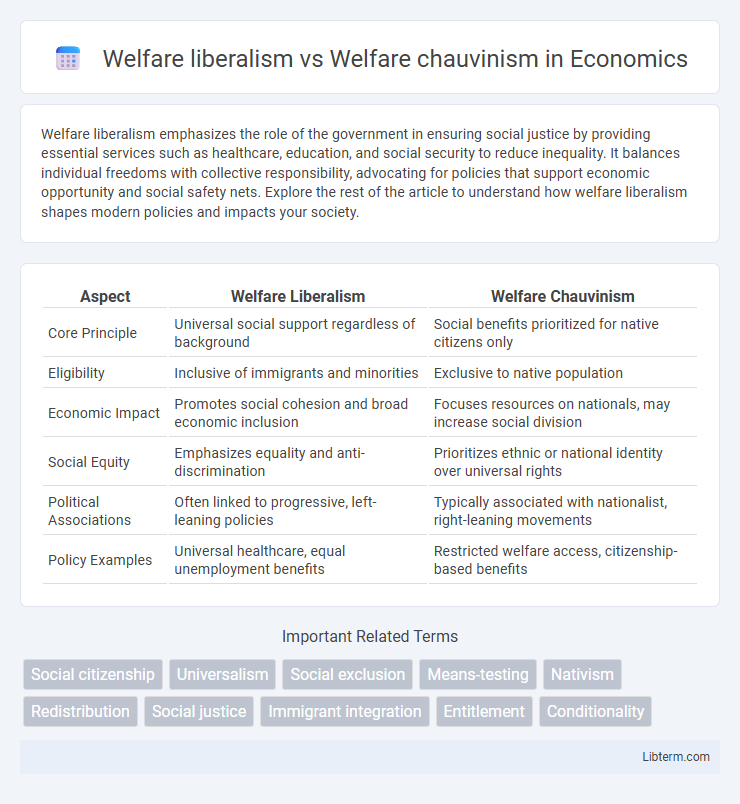Welfare liberalism emphasizes the role of the government in ensuring social justice by providing essential services such as healthcare, education, and social security to reduce inequality. It balances individual freedoms with collective responsibility, advocating for policies that support economic opportunity and social safety nets. Explore the rest of the article to understand how welfare liberalism shapes modern policies and impacts your society.
Table of Comparison
| Aspect | Welfare Liberalism | Welfare Chauvinism |
|---|---|---|
| Core Principle | Universal social support regardless of background | Social benefits prioritized for native citizens only |
| Eligibility | Inclusive of immigrants and minorities | Exclusive to native population |
| Economic Impact | Promotes social cohesion and broad economic inclusion | Focuses resources on nationals, may increase social division |
| Social Equity | Emphasizes equality and anti-discrimination | Prioritizes ethnic or national identity over universal rights |
| Political Associations | Often linked to progressive, left-leaning policies | Typically associated with nationalist, right-leaning movements |
| Policy Examples | Universal healthcare, equal unemployment benefits | Restricted welfare access, citizenship-based benefits |
Defining Welfare Liberalism and Welfare Chauvinism
Welfare liberalism advocates for social policies that promote equality and inclusion by providing welfare benefits universally, regardless of ethnicity or background, emphasizing social justice and economic support for all citizens. Welfare chauvinism, in contrast, supports welfare provisions exclusively for native-born or majority group members while restricting access to immigrants and minorities, often rooted in nationalist and exclusionary beliefs. These opposing approaches reflect fundamentally different views on who deserves social support within a society's welfare system.
Historical Origins and Evolution
Welfare liberalism originated in the late 19th and early 20th centuries, rooted in the progressive movement aimed at expanding social safety nets and promoting inclusive welfare policies for all citizens regardless of ethnicity or nationality. In contrast, welfare chauvinism emerged more prominently in the late 20th century, associated with nationalist and right-wing populist movements that advocate restricting welfare benefits to native-born citizens, emphasizing cultural homogeneity and limiting support for immigrants. These divergent ideologies evolved through differing responses to economic crises, immigration waves, and societal integration challenges, shaping contemporary debates on social policy and inclusion.
Core Principles and Ideological Foundations
Welfare liberalism emphasizes universal social rights and state responsibility to provide equitable access to healthcare, education, and social security, grounded in principles of social justice and individual rights. Welfare chauvinism restricts welfare benefits to native-born citizens or specific ethnic groups, rooted in nationalist and exclusionary ideologies that prioritize in-group solidarity over universalism. These contrasting ideological foundations shape inclusive versus exclusionary policy approaches to social welfare systems.
Key Policy Approaches and Differences
Welfare liberalism emphasizes inclusive social policies aimed at broad-based welfare provision, promoting equal access to healthcare, education, and social security regardless of ethnicity or nationality. Welfare chauvinism advocates for restricting welfare benefits primarily to native citizens, prioritizing national identity and often linking welfare access to immigration control. The key difference lies in welfare liberalism's universalist approach versus welfare chauvinism's exclusionary and protectionist stance on social benefits.
Attitudes Toward Immigration and Social Inclusion
Welfare liberalism promotes inclusive social policies that extend benefits universally, supporting immigration as a means to enhance diversity and social cohesion. Welfare chauvinism, conversely, restricts welfare benefits to native-born citizens, fueling exclusionary attitudes and limiting access for immigrants. These contrasting approaches shape public opinion, with welfare liberalism correlating with pro-immigration stances, while welfare chauvinism often accompanies stronger anti-immigration sentiment and social exclusion.
Effects on Social Cohesion and Integration
Welfare liberalism promotes inclusive social policies that enhance social cohesion by providing equal access to welfare benefits regardless of ethnicity or nationality, fostering integration and reducing social divisions. Welfare chauvinism restricts benefits primarily to native-born citizens, which often exacerbates social fragmentation, increases exclusion of immigrant groups, and undermines integration efforts. Studies indicate that inclusive welfare systems correlate with higher social trust and stronger community bonds, while exclusive welfare approaches tend to heighten tensions and social polarization.
Economic Implications and Resource Allocation
Welfare liberalism supports inclusive social policies that allocate resources broadly to promote equal economic opportunities and reduce poverty across all demographic groups, fostering overall economic growth. Welfare chauvinism restricts access to welfare benefits based on national or cultural identity, prioritizing resource allocation to native citizens and potentially creating labor market segmentation and social exclusion. These divergent approaches impact public spending patterns, labor force participation, and economic inequality, influencing long-term fiscal sustainability and social cohesion.
Case Studies: Global Examples in Practice
Welfare liberalism emphasizes inclusive social policies that extend benefits universally, as seen in Scandinavian countries like Sweden and Denmark where comprehensive welfare systems support diverse populations irrespective of ethnicity or nationality. Welfare chauvinism restricts benefits to native citizens, evident in countries such as Denmark and Austria, where political parties advocate limiting social programs to protect native workers from perceived economic threats posed by immigrants. These contrasting approaches highlight global debates over social cohesion versus protectionism in welfare policy design.
Public Opinion and Political Discourse
Welfare liberalism emphasizes inclusive social policies that extend benefits universally, promoting equality and social justice, often supported by progressive public opinion favoring diversity and multiculturalism. Welfare chauvinism restricts welfare benefits to native or majority groups, reflecting nationalist sentiments and skepticism toward immigration prevalent in certain political discourses and public attitudes. Political debates around welfare increasingly polarize these views, with rhetoric shaping public opinion by linking social benefits to national identity and economic competition.
Future Trends and Policy Challenges
Welfare liberalism emphasizes inclusive social policies that promote universal access to healthcare, education, and social security, anticipating future trends toward globalization and demographic shifts. Welfare chauvinism prioritizes welfare benefits for native citizens, posing policy challenges linked to immigration, social cohesion, and rising nationalism. Balancing inclusive welfare demands with nationalist pressures will be essential for sustainable social policy development in diverse, aging populations.
Welfare liberalism Infographic

 libterm.com
libterm.com